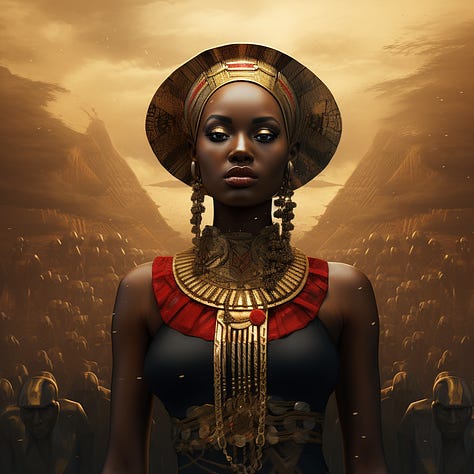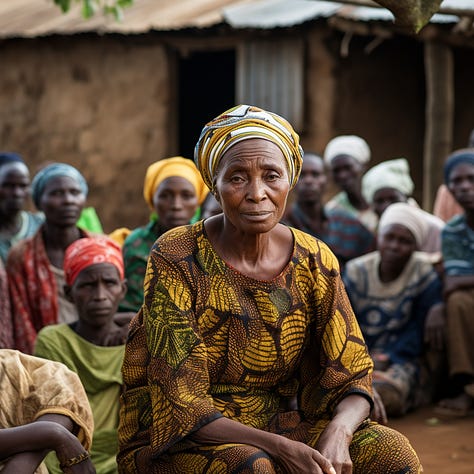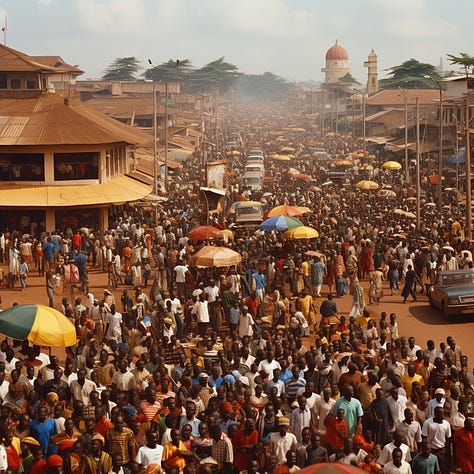Two Swarthmore students organized a really rich symposium here last weekend on the theme “Africa Is Rising”. In the end, even the almost entirely optimistic roster of speakers collectively added a question mark to the end of that title, as I think they had to.
I was impressed with the invited speakers, but one really got my attention: Kah Walla, a Cameroonian politician, activist and consultant. Walla had a clear, pragmatic, no-nonsense way of speaking about the persistent failures of the Cameroonian state since independence and the seemingly unending torment of Paul Biya’s rule in particular. And yet, Walla also insisted that Cameroonians needed to imagine, plan for and even count on a political transition from the malfunctioning political order that was imposed on Cameroon during decolonization to a responsive and consultative state and a political system that serves its people rather than victimizes them.
That preparation, as Walla saw it, should include some form of ground-level conversation between Cameroonians in their home communities about what exactly they want from government, about what they think politics ought to be like. That’s a tall order in a repressive society where the existing government has zero interest in that conversation and has a presence even in the smallest communities. Walla’s insistence that this conversation can at least begin under the present dispensation, and that it can be queued up in advance, waiting for the least moment of opportunity, got me thinking. Are there 19th and 20th Century examples of a society in a nominally sovereign territory starting over in this way, through something like a highly structured visioning exercise?
Historians are chronically suspicious of analogies to the point sometimes of being phobic of all comparisons where there is no direct linkage between two cases. So the natural place for me to start trying to answer that question would be within the frame of decolonization in Africa. Walla’s central point about Cameroon is that there never was a moment during the decolonization process where Cameroonians were asked—or asked themselves—what kind of state would they want? how should the state operate?



This is a common point about 20th Century decolonization in general. The British, French and Belgian administrations from the 1950s to the 1970s that reluctantly set about transferring power devised voting systems that would allow the nation’s new citizens to select the political parties that would rule over the new nation, and helped to shape constitutions that set out the basic structures of the nation’s legal systems, representative structures, executive departments, and so on. Most of the time, at least some group of leaders and interest groups from the nation-to-be played some role in shaping the outcomes, though often within some tight constraints imposed by the imperial power.
I think it is fair to say that in those negotiations, neither side took much interest in fundamental rethinking of the state’s design or functioning. There were groups that did want to rethink the state, and often also some fundamental dimensions of its relationship to the metropole and the global system, but as Frederick Cooper and many other historians have related, those groups were generally pushed to the margins of the transition and were then often absorbed or liquidated by the nationalists who won out and took power after independence.
I witnessed this directly in the case of Zimbabwe, one of the last instances of formal decolonization. More than a decade after independence, Zimbabwean ministries were still using the paper forms they inherited from their Rhodesian predecessors—sometimes not even bothering to replace the government name at the top of the form. They conducted their procedures on a largely similar basis as before, and along the same lines of compartmentalization. The police and military were no longer commanded by white officers, but predominantly displayed the same attitude towards their citizens as they had under white rule. The state still functioned as a tool for extraction and still operated at an autocratic distance from the population, an attitude which intensified over the 1990s and beyond.
I think the only case where you can argue that the decolonization process included some degree of popular mobilization aimed at questioning whether the state should go on in a familiar form is that of Guinea. The historian Elizabeth Schmidt has argued at length that Guinea was not “decolonization from above”, and that the famous decision to vote non on a continued association with France was the result of a genuinely populist determination to walk another road. I accept that analysis, but it’s hard to look at Guinea after 1970 or so and think that the non vote culminated in a genuinely from-below rethinking of the nature of the state. Looking back from 2024, Sékou Touré looks much like the other African nationalists who grew old in power and controlled states that were unresponsive to their people and incapable of delivering services in any remotely functional way, whether those services were conceptualized as socialist, capitalist or none of the above.
The other counter-example would have to be South Africa, which really did engage in a thorough, careful and genuinely consultative process of constitutional design in the transition from the apartheid state to majority rule. It is hard not to think that one of the legitimately “exceptionalist” elements of that transition is that it was not accomplished through a negotiation (or struggle) between foreign colonizers and indigenous subjects where both parties assumed that the problem in their relationship was the foreign character of imperial rule but that the administrative state was “modern” and therefore an infrastructural asset to retain. Pretty much everybody at the table in South Africa understood that a real transition required more than just an election, that apartheid had been “baked in” to the fundamental constitutional and legal underpinnings that defined the state.
And yet even with that degree of consultation, it’s striking how much of the state was not only retained but not really subjected to any sort of popular or democratic review. Nobody involved in the transition process sincerely thought about reinventing policing or jails, an oversight whose magnitude became urgently apparent in the decade that followed. The ANC had so ardently proclaimed its inconsistent and at times self-wounding pursuit of an armed struggle as an important cause of apartheid’s end, so they were not about to actively reconsider whether to even have a conventional sort of military with the rather outsize budgeting that the apartheid state’s military had become accustomed to. In terms of its administrative structures and concepts, the state remained significantly intact.
In the case of South Africa, the relative shallowness of the conversation about what people wanted from government, about how they imagined politics, became almost immediately evident in the work of the Truth and Reconciliation Commission, whose designers pushed ahead with a framework that they (rightfully) saw as consistent with the propositional logic of the new constitution and the nation it meant to inaugurate but which was in various ways potently out of touch with the everyday political visions of many of the people that the TRC aimed to serve. Ever since that time, the actuality of South African civil society and the sociopolitical networks that speak to and mobilize many of the country’s residents have remained uneasily out of alignment with the putatively consultative constitution and the nation it undergirds.
I say this as a big fan of the South African constitution. There have been a number of moments where I’d much prefer to live under its precepts than what I read to be some forms of widespread or popular visions of the political. But at the very least, the gap in South Africa underscores how difficult the vision of transition that Kah Walla hopes to see in Cameroon might really be should an opportunity arise.
I think that has been the problem everywhere in modernity for political visionaries who are driven nearly mad by the dysfunctionality of the states they endure. They can see designs which plainly should be better, and which in many cases, actually exist in the world in some form. E.g., you do not have to pine for a millennarian vision of a perfect socialist future or a frictionlessly efficient neoliberalism if you’re looking for something better than broken-down authoritarianism or the increasingly shambolic and embarrassing state of American politics. You can just wish for social democratic administrative and institutional norms on the model of the Scandinavian states as a functional alternative. Or, to be honest, you could just wish for an authoritarianism that actually works on the model of Singapore. (There are those who argue that Rwanda under Kagame has achieved that benchmark.)
The problem even of that more modest imagination of a re-imagined state, in Africa or elsewhere, is that it may have little to do with what most people in a given territory think about politics, authority, or government. That might be why those states work fairly well in Scandinavian nations: because they align with how the population by and large thinks about government and politics.
I think Kah Walla is right that the only way to build states that not only function but endure in sub-Saharan Africa is to start from scratch, and to start from scratch means beginning with something like a foundational conversation that rises up from all the people in all their communities. I think the problem is that this conversation may not lead where the visionaries hope or expect, and as long as the process is expected to culminate in something like a recognizable government in command of an internationally-agreed-upon territory that performs all the expected functions and behaves in all the expected ways, the conversation is never going to be more than a short speed bump in a circular road that leads back to the usual suspects.



